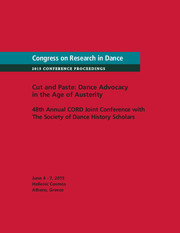No CrossRef data available.
Article contents
Dance at Graduate Universities in the South of Brazil: Experiences and Perspectives
Published online by Cambridge University Press: 02 August 2016
Abstract
This round table presents an overview of activities developed at higher education institutions with graduate and postgraduate studies in dance in Brazil, especially southern Brazil. Oddly enough, amid the global crisis in early 2008, the Brazilian government launched an educational program that allowed the expansion of courses at the graduate level, including dance, in several public and free universities. As an example of this scenario, we present our experiences in two public universities, UFRGS and UDESC. These dance courses have seen increasing interest and confrontation the presence of artists and researchers seeking to investigate their own work or the work of others. How can we contemplate structuring contents and methods to teach dance in the university context? How does a dance artist associate the experience of dancing to academic research? How does teaching dance force universities to think about embodied knowledge? The situation of teaching dance in Brazilian universities shows that there is still a lot to be done, considering that the creation of these courses is rather new and that dance, in this context, is an area of ongoing consolidation. The struggle to create a greater number of dance courses in universities is part of the discussion of this session. The practice of teaching dance in universities seeks to articulate repertoires of knowledges that belong to different traditions and artistic experiences transversed by reflections about contemporary dance, and to qualify the teacher, the dancer, and the researcher.
Information
- Type
- Research Article
- Information
- Copyright
- Copyright © Mônica Dantas, Sandra Meyer, and Suzane Weber 2016

